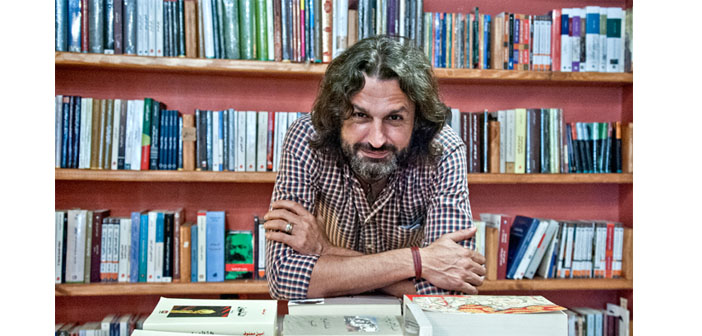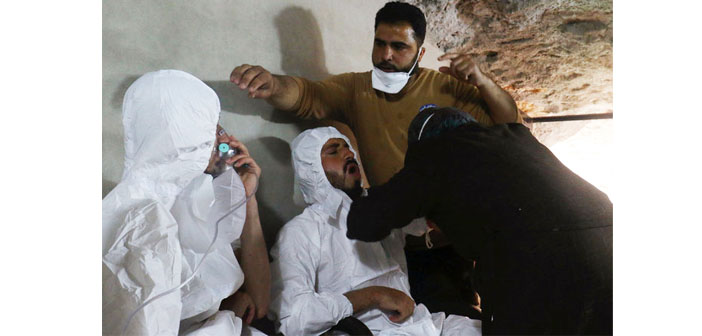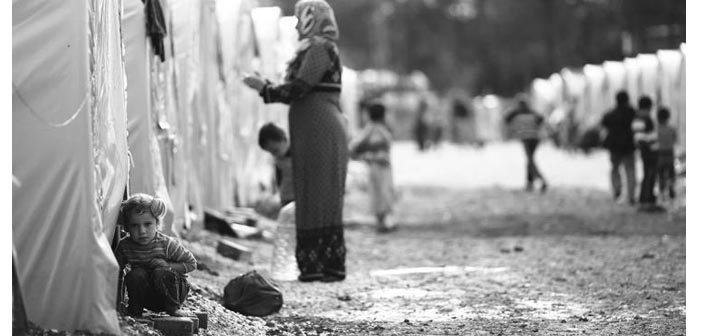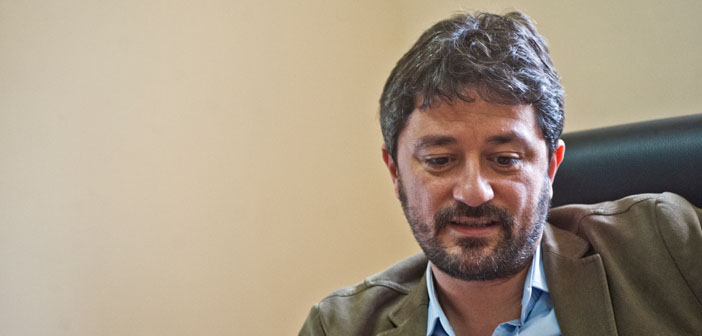Around the corner from the Chora church sits a wooden building, a cultural hub for the city’s burgeoning Syrian population. This month, Pages, one of Istanbul’s two Arabic book stores, tucked carefully between the back streets of Edirnekapi, is celebrating its first anniversary.
Samer al-Kadri, co-founder of Pages Bookstore and Cafe with his wife Gulnar Hajo, says, “I came here for 5 days and I liked it and I decided I should move here, live here.”Originally from Hama, Samer moved to Damascus in 1982 after a massacre by government forces which killed between 10-40,000 people. 30 years later, he and his family were forced to flee Damascus as well.
In 2012, Samer and Gulnar were attending a book fair in Abu Dhabi, while Samer’s mother and sister took care of their two children in Damascus. While there, he received a phone call from his office. Security forces of the Assad regime had come to the office looking for Samer, and in his place found two employees who they detained and released 24 hours later. They warned him not to return back to Damascus. Samer and Gulnar flew to Jordan and a relative took their children to Amman to meet them.
“I was forced to leave my country. OK, let’s just find another, some place I like to live.” Samer is pragmatic, but with a hint of humour when talking about his situation. “Jordan is boring, there’s nothing. Istanbul is more beautiful, and looks like Damascus a lot,” and so the decision was made.
“I registered through the internet for school for my children, Syrian school, by internet. I didn’t know where is the school, I didn’t know the area, I didn’t know anything,” he says. The family simply relocated to Balat in order to be close to the children’s school. “I don’t hate this area in any way. It is religious, I am not religious. But I like it more than Taksim.” Fatih, he says, is more family-friendly, and for Samer and Gulnar, children are “our aim.”
An oasis called "Pages"
Pages hosts regular workshops for children, run by Gulnar, who facilitated children’s workshops in Syria and across the Arab world before the family moved to Turkey in 2013. By trade, she is an illustrator and author of children’s books. The workshops delve into art, crafts, reading and stories - “creative things… Education is not our job.” Rather, than educate, Pages seeks to enlighten nascent creative potential.
Outside of Ramadan, Pages is teeming with people from all walks of life. Some workshops have hosted Syrian children coming from Esenyurt, the kids of European expats and local Turkish children. “Everybody welcomed us in this neighbourhood,” and so Pages serves not only Arabic-speaking patrons.
Carefully built and decorated over a period of 7 months in the place of a previous residential building, the shop is an oasis in the middle of busy Istanbul. The brick walls of Pages are lined with books in Arabic, Turkish and English, with a few in German here and there, though most buyers, he says, are young Arabs. Children’s books in all languages nest in the basement, with adults’ literature on the ground floor and the cafe and garden one flight up. The children’s workshop area takes the top floor.
It’s not just the air conditioning and variety of refreshments that makes Pages feel like an oasis: it’s the inviting atmosphere, the ever-smiling host and the constant buzz of classic Arabic songs from the speakers. Visitors can read for free in Pages, for as long as they want, and the shop also runs a library service. The music, too, doesn’t always come via youtube - every Saturday is music night.
“I don’t write, I’m a painter,” he says. “I can’t write two lines… but I can read good.” Perhaps Samer is an unlikely figure to run a publishing house and a bookstore for this reason, however, his endeavours have been quite the success. The pair’s publishing house, Bright Fingers, is counted amongst the best 5 in the Arab world for children’s literature, he claims. In Pages’ second year, he is planning to create a publishing house for adults as well.
Need for a new generation
“We will just focus on the new generation writing new things, new ideas,” he describes. “It doesn’t matter if these new writers are imperfect or unprofessional,” he says, “we need a new generation, not just the old generation who tells us what we should do.” Samer already has a group of writers from Syria who are planning to publish under this new project, and is looking for more. Next year, he’d also like to run a competition for writers, painters and filmmakers, culminating in a festival to celebrate their art works. “I want to see the happiness in Syrian eyes,” he says, and such projects are a way for Samer to see this.
‘This place gives me happiness for a moment,’ he says of Pages. Genuine happiness isn’t easy to find for most Syrians in exile, so while Samer may be always smiling, he says most of his smiles are for show. ‘I hope we will smile again from the inside,’ he adds. He’s not sure whether he’ll be happy one day, yet he’s full of hope, ‘too much’ hope. While Samer and Gulnar have made a home in Istanbul, he hopes to return to Syria one day.
Something called revolution
“This place is kind of a revolution,” he says, “because it’s open to everyone.” The revolution, for Samer, continues, and will continue for as long as it takes, whether that be 5, 10 or 50 years. He recounts the revolution, the causes of which for him began under Bashar al-Assad, who increased economic and societal divisions and stripped people of dignity, as a peaceful uprising in the streets.
“Revolution is not something beautiful… Always there is blood, a lot of blood, and it doesn’t bring democracy,” he muses. “Revolution… overturns. And she brings with her all the dirty things, at first, and after a long time, you need to fix the situation.” He’s not nostalgic for the revolution, or for Syria. Rather, he respects them both.
“I don’t miss anything, really… For 25 years, I lived in this home with my family in this neighbourhood in Damascus... [but] I don’t miss this neighbourhood.” Instead, he says, “Syria for me is now like mission… If all of us left it alone, it is very dark in the future. We should return back to do something. Maybe I can handle it, maybe not, maybe I can live there, maybe not. But now, I want to get back. After that, I don’t know.”





